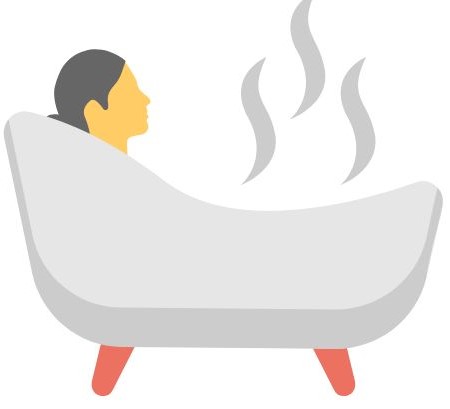In today’s fast-paced world, finding moments of relaxation and self-care can be a challenge. Amidst the hustle and bustle of daily life, many people are seeking effective ways to unwind and recharge. One time-tested remedy that has been cherished across cultures and centuries is the simple act of taking a hot bath. This soothing practice is not just a luxurious indulgence; it offers a myriad of benefits that can enhance physical, mental, and emotional well-being.
From the ancient Roman baths that served as social and healing hubs to the traditional Japanese onsen, bathing rituals have long been recognized for their restorative properties. The warm embrace of water can soothe tired muscles, calm racing thoughts, and provide a sanctuary for introspection. Beyond relaxation, numerous studies suggest that hot baths can positively impact health, from improving sleep quality to alleviating chronic pain.
In this article, we will delve into the various benefits of taking a hot bath, exploring how this simple practice can contribute to better overall health and a more balanced lifestyle. Whether you’re looking to relieve stress, enhance your skin’s appearance, or improve your mood, the humble hot bath may just be the answer. Join us as we uncover the science behind these benefits and offer tips on how to make the most of your bathing experience.
1. Hot Bath for Stress Relief and Relaxation
Psychological Benefits
- Reduction of Cortisol Levels:
- Stress Hormone: Cortisol, often referred to as the stress hormone, plays a significant role in the body’s response to stress. Elevated levels can lead to various health issues, including anxiety, depression, and weakened immune function. Research indicates that soaking in a hot bath can help lower cortisol levels, fostering a sense of calm and well-being.
- Hormonal Balance: By reducing cortisol, hot baths can help restore balance to other hormones, promoting a more stable mood and improved mental health.
- Mindfulness and Meditation:
- Creating a Calm Space: A hot bath can serve as a personal retreat, providing an opportunity to disconnect from daily stressors. The act of soaking in warm water encourages mindfulness, allowing individuals to focus on the present moment and their physical sensations.
- Enhanced Mental Clarity: The tranquility of a hot bath can facilitate deeper thought processes, making it easier to engage in reflective practices or problem-solving. This mental clarity can lead to greater emotional resilience when facing stress.
Physical Relaxation
- Muscle Relaxation:
- Heat Therapy: The warmth of the water can penetrate deep into muscle tissues, helping to relieve tension and discomfort. This is particularly beneficial for individuals with muscle strains, chronic pain, or those recovering from workouts.
- Improved Flexibility: As muscles relax, the body may experience improved flexibility and a greater range of motion, which can contribute to better physical performance and reduced risk of injury.
- Increased Blood Circulation:
- Enhanced Blood Flow: The heat from the bath dilates blood vessels, promoting increased circulation throughout the body. This improved blood flow can deliver more oxygen and nutrients to tissues, aiding recovery and reducing fatigue.
- Support for Recovery: For those recovering from injuries or intense workouts, enhanced circulation can expedite healing processes and reduce muscle soreness.
Emotional Benefits
- Calming of the Mind:
- Alleviating Anxiety: The combination of warm water, quiet surroundings, and the opportunity to focus on breathing can significantly reduce feelings of anxiety. Many people find that a hot bath is an effective way to calm racing thoughts and foster a sense of inner peace.
- Ritual of Self-Care: Taking time for a hot bath can serve as an important self-care ritual, reinforcing the idea that prioritizing personal well-being is essential. This dedicated time can create a positive feedback loop that encourages more self-care practices.
- Enhanced Mood:
- Release of Endorphins: The relaxation experienced during a hot bath can stimulate the release of endorphins, the body’s natural “feel-good” hormones. This can lead to an uplifted mood and an overall sense of happiness.
- Improved Emotional Regulation: Regularly engaging in self-care activities, such as taking hot baths, can help individuals better manage their emotions and respond to stressors with greater resilience.
Creating the Ideal Environment
To maximize the stress-relieving benefits of a hot bath, consider the following elements:
- Setting the Mood: Dim the lights, light some candles, or use essential oils to create a calming atmosphere. Soft music or nature sounds can further enhance relaxation.
- Mindful Breathing: Incorporate deep breathing exercises while soaking. Inhale deeply through the nose, hold for a moment, and exhale slowly through the mouth. This can enhance relaxation and reduce anxiety.
- Limit Distractions: Put away electronic devices to avoid interruptions and allow yourself to fully immerse in the experience.
Taking a hot bath can be a powerful tool for stress relief and relaxation, offering both psychological and physical benefits. By lowering cortisol levels, promoting muscle relaxation, and creating an environment conducive to mindfulness, hot baths can significantly enhance overall well-being. Incorporating this simple yet effective practice into your routine can lead to a more balanced and serene lifestyle, allowing you to face life’s challenges with greater ease and resilience.
2. Improved Sleep Quality
Sleep-Inducing Benefits
- Body Temperature Regulation:
- Thermal Dynamics: When you immerse yourself in a hot bath, your body temperature rises. Upon exiting the bath, the rapid cooling of your skin sends signals to your brain that it’s time to sleep. This natural drop in body temperature mimics the body’s normal cooling process that occurs when preparing for sleep, facilitating a smoother transition into slumber.
- Circadian Rhythm Support: Maintaining a consistent body temperature can help regulate your circadian rhythms, which govern sleep-wake cycles. A hot bath can act as a cue that it’s time to wind down for the evening.
- Calming Effect:
- Relaxation Response: The soothing warmth of a hot bath activates the parasympathetic nervous system, which is responsible for the body’s rest-and-digest response. This physiological shift can reduce feelings of stress and anxiety, making it easier to fall asleep.
- Mental Clarity: A hot bath provides a tranquil space to unwind, allowing your mind to clear from the day’s worries. This mental relaxation is essential for creating the right conditions for restful sleep.
Recommended Practices
- Timing:
- Optimal Bath Time: For the best sleep outcomes, aim to take a hot bath about 90 minutes before bedtime. This timing allows for sufficient cooling of the body and helps set the stage for sleep.
- Routine Establishment: Incorporating a hot bath into your nightly routine can signal to your body that it’s time to prepare for sleep, creating a consistent and calming pre-sleep ritual.
- Duration and Temperature:
- Bath Length: Soaking for about 15 to 30 minutes is generally ideal. This duration allows the body to relax without causing overheating, which could lead to discomfort.
- Temperature Considerations: A comfortable bath temperature is typically around 100-104°F (37-40°C). Ensure that the water isn’t too hot, as excessive heat can lead to fatigue or dehydration.
Additional Factors Contributing to Sleep Quality
- Reduced Muscle Tension:
- Soothing Sore Muscles: The warmth of the bath helps relax muscles, alleviating physical tension that may interfere with restful sleep. This relaxation can be particularly beneficial for those who experience discomfort or pain, making it easier to settle into a restful state.
- Enhanced Comfort: Reduced muscle tension and discomfort can lead to a more comfortable sleeping position, promoting deeper sleep.
- Mental Health Benefits:
- Alleviating Anxiety and Depression: Regularly taking hot baths has been associated with reduced symptoms of anxiety and depression. Improved mental health can directly impact sleep quality, making it easier to fall asleep and stay asleep throughout the night.
- Mindfulness Practices: Engaging in mindfulness or meditation while bathing can further enhance relaxation and promote a sense of well-being, contributing to better sleep.
Creating a Sleep-Friendly Environment
To enhance the sleep benefits of a hot bath, consider the following tips:
- Calming Ambiance: Set the mood with soft lighting, calming scents (like lavender or chamomile), and gentle music. These elements can create a serene atmosphere conducive to relaxation.
- Limit Screen Time: Avoid screens for at least 30 minutes before bedtime to minimize blue light exposure, which can interfere with melatonin production and disrupt sleep patterns.
- Follow with a Relaxing Activity: After your bath, engage in calming activities such as reading, light stretching, or gentle breathing exercises to maintain a relaxed state as you prepare for bed.
Taking a hot bath can significantly improve sleep quality by facilitating body temperature regulation, promoting relaxation, and reducing muscle tension. By incorporating this soothing practice into your nightly routine, you can create an effective strategy for enhancing your sleep experience. With consistent practice, the calming effects of hot baths can help you achieve deeper, more restorative sleep, contributing to overall physical and mental well-being.
3. Skin Health and Detoxification
Skin Benefits
- Improved Blood Flow: The increased circulation during a hot bath can enhance the delivery of nutrients to skin cells, promoting a healthier complexion.
- Open Pores: The steam and heat can help open pores, allowing for the release of impurities and dirt, potentially improving skin clarity.
Detoxification
- Sweating: Hot baths can induce sweating, which is a natural way for the body to eliminate toxins. This detoxification process may support overall health.
4. Pain Relief and Muscle Recovery
Benefits for Chronic Pain
- Arthritis Relief: Warm water can soothe aching joints and reduce stiffness, making hot baths beneficial for individuals with arthritis or other chronic pain conditions.
- Menstrual Cramps: The heat from a bath can relax the muscles of the uterus, providing relief from menstrual cramps.
Post-Workout Recovery
- Muscle Recovery: Athletes often use hot baths as a part of their recovery routine. The heat can reduce muscle soreness and speed up recovery times.
5. Respiratory Benefits of Hot Bath
Benefits for Breathing
- Steam Inhalation: The steam produced in a hot bath can help relieve congestion and improve respiratory function, making it easier to breathe for individuals with colds, allergies, or asthma.
- Soothing Effect: The warmth can also help relax the muscles in the respiratory system, contributing to easier breathing.
6. Enhanced Mood and Mental Well-being
Psychological Effects
- Boost in Serotonin: Soaking in a hot bath can stimulate the release of serotonin, the “feel-good” hormone, which can improve mood and combat feelings of depression.
- Time for Reflection: Baths can provide a much-needed break from daily stressors, allowing for quiet reflection and mental clarity.
Creative Inspiration
- Enhanced Creativity: Many people find that they experience bursts of creativity while soaking in a bath. The relaxed state can facilitate problem-solving and inspire new ideas.
7. Social and Relationship Benefits
Quality Time
- Bonding Experience: Sharing a hot bath with a partner can enhance intimacy and strengthen relationships. The setting promotes connection and relaxation together.
Self-Care Ritual
- Personal Time: Taking a bath can be a form of self-care, allowing individuals to prioritize their well-being and indulge in a peaceful experience amidst busy lives.
8. Practical Considerations and Tips
Safety Precautions
- Temperature Regulation: It’s essential to ensure that the water temperature is comfortable (generally around 100-104°F or 37-40°C) to avoid overheating or burns.
- Hydration: Stay hydrated by drinking water before and after your bath, as hot water can lead to dehydration.
Maximizing Benefits
- Additives: Consider adding Epsom salts, essential oils, or herbal infusions to enhance relaxation and provide additional health benefits.
- Ambient Environment: Create a calming atmosphere with dim lighting, soothing music, or aromatherapy to maximize the relaxation experience.

Taking a hot bath can be much more than a simple indulgence; it offers numerous physical and mental health benefits. From relieving stress and promoting better sleep to aiding in muscle recovery and enhancing skin health, the advantages of soaking in warm water are substantial. By incorporating hot baths into your self-care routine and following safety precautions, you can harness these benefits for improved overall well-being. Whether as a solitary retreat or a shared experience, a hot bath can be a powerful tool for relaxation and rejuvenation.







